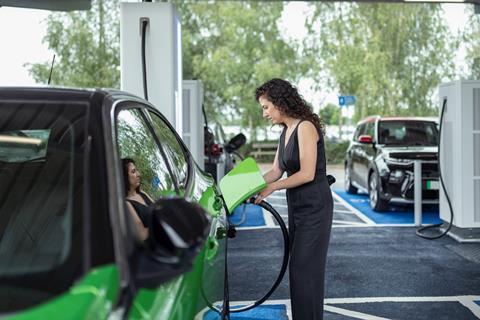
Petrol car drivers have a poor level of knowledge about EVs, according to a new YouGov survey for the Energy and Climate Intelligence Unit (ECIU).
When asked if 10 separate statements about EVs were true or false, more than half (57%) of petrol/diesel cars drivers got just two or fewer out of 10 correct, with 90% scoring just five or fewer out of 10. Around a quarter (23%) got none correct.
The ECIU says this lack of knowledge is affecting drivers’ car choices, with people who display a poor understanding of EVs being less likely to want their next car to be an EV. Drivers who scored two or fewerout of 10 were 11 times less likely to want their next car to be an EV than those who scored eight or more out of 10.
YouGov surveyed 1,000 non-EV and 1,000 EV drivers in the UK earlier this year.
The survey follows a Lords committee report on EVs, published earlier this year, which expressed concern about a “concerted campaign of misinformation” about EVs. The ECIU says this latest polling illustrates the impact of this misinformation, confusing people about the realities of EV ownership and dissuading them from making the shift to cleaner and cheaper electric driving.
Colin Walker, head of transport at ECIU, says: “Poll after poll has found EV drivers love their cars and simply wouldn’t go back to petrol. But all the myths being pedalled about EVs are misleading some petrol car drivers who now have a really poor knowledge of electric cars. For example, they don’t realise that a petrol car costs a lot more to own and run over its lifetime than an electric car – a ‘petrol premium’ that can leave them hundreds of pounds out of pocket every year. The constant stream of EV misinformation is clearly causing confusion and holding many of the UK’s drivers back from making the switch to cleaner and cheaper electric driving.”
Edmund King, AA president, says: “The switch to EVs is a big jump for many, particularly when they don’t know what they are getting into. We find drivers are ‘hesitant’ rather than ‘hostile’ and much of this hesitancy is fuelled by misinformation. Once drivers get behind the wheel of an EV they rarely look back when they realise that EVs are better in terms of economy, environment and excitement.”
The survey covered costs of owning and running an EV, charging, the natural resources needed to build and run an EV and even the likelihood of a fire. It found:
• Nearly two-thirds (62%) of petrol drivers believe it’s more expensive to own and run an EV, with only 14% correctly recognising that EVs are typically cheaper. A report from ECIU found that the drivers of the top 10 selling petrol cars of 2023 can find themselves paying a petrol premium of £700 a year in running costs, compared to an equivalent electric car.
• 41% of petrol drivers incorrectly think that EVs are more likely to catch fire than petrol cars, with only 24% correct in their understanding that they are less likely to catch fire. Evidence from EV Fire Safe indicated that EVs are more than 80 times less likely to catch fire than petrol or diesel cars.
• More than half (59%) of petrol drivers thought the UK’s electricity grid “will not be able to cope” with the UK’s shift to EVs, whereas only one in five (20%) correctly identified this statement as false. The ECIU says the National Grid has explicitly labelled this a ‘myth’ and is clear that the power system will be able to cope with millions more EVs in the UK.
• 80% of petrol drivers think the UK is not on course to install the charging infrastructure it needs, despite the country being ahead of schedule to hit its target of 300,000 chargers on the UK’s roads by 2030.
• More drivers (35%) incorrectly believed that an EV’s lifetime CO2 emissions are no less than those of a petrol car than correctly identified this statement as false (32%). An EV being driven in the UK produces three times less lifetime CO2 emissions than an equivalent petrol or diesel car.
Where more petrol car drivers got the answer right than wrong was around energy independence where 37% recognised that more EVs running on British renewable electricity would make the UK more energy independent than relying on increasing imports of oil and petrol. Some 29% agreed with the incorrect statement that EVs would weaken the UK’s energy independence.
Some 54% correctly disagreed with the statement that EVs are not better for urban air quality than petrol cars. Only 28% believed this statement to be true.
More petrol drivers (39%) correctly disagreed with the statement that EVs pose a threat to the structural integrity of the UK’s car parks than incorrectly agreed with it (33%).
































